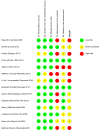De-Escalation of Anti-Tumor Necrosis Factor Alpha Agents and Reduction in Adverse Effects: A Systematic Review
- PMID: 35625771
- PMCID: PMC9139158
- DOI: 10.3390/biomedicines10051034
De-Escalation of Anti-Tumor Necrosis Factor Alpha Agents and Reduction in Adverse Effects: A Systematic Review
Abstract
Background: The long-term use of anti-TNF-α agents can lead to adverse effects, such as infections and immune-mediated cutaneous reactions. Whether de-escalation by dose reduction or interval lengthening reduces these adverse effects is uncertain. This systematic review aims to compare the incidence of infections and skin manifestations after anti-TNF-α dose de-escalation with standard dosing.
Methods: MEDLINE, EMBASE, and the Cochrane Central Register of Controlled Trials were searched from inception to 14 January 2022. Randomized controlled trials (RCTs) and observational studies comparing anti-TNF-α de-escalation strategies with standard dosing among patients with inflammatory conditions, that report on infections, skin manifestations, or both, were included. The risk of bias was assessed with the revised Cochrane risk-of bias tool (RCTs) or the Newcastle-Ottawa scale (non-RCTs).
Results: Fourteen RCTs and six observational studies (or 2706 patients) were included. Eight RCTs had low risk of bias or some concerns. Four non-RCTs were of good methodological quality. The studies described patients with axial spondyloarthritis (8 studies, 780 patients), rheumatoid arthritis (7 studies, 1458 patients), psoriasis (3 studies, 332 patients), or inflammatory bowel disease (2 studies, 136 patients). De-escalation strategies included interval lengthening (12 studies, 1317 patients), dose reduction (6 studies, 1130 patients), or both (2 studies, 259 patients). Overall, the occurrence of infections and skin manifestations did not differ between standard treatment and de-escalation. The disappearance of infections or skin manifestations after de-escalation was only reported in two studies. The majority of studies focused on etanercept and adalimumab. Heterogeneity in reporting of infections and skin manifestations precluded meta-analysis.
Conclusion: We found that anti-TNF-α de-escalation does not reduce infections or skin reactions. A de-escalation strategy should not be recommended for the sole purpose of reducing drug-related adverse effects. The meticulous documentation of adverse effects is recommended to further address this question.
Registration: PROSPERO CRD42021252977.
Keywords: adalimumab; adverse effects; certolizumab pegol; dose reduction; etanercept; golimumab; infliximab; interval lengthening; tumor necrosis factor inhibitors.
Conflict of interest statement
The authors declare no conflict of interest.
Figures


References
-
- Bressler B., Yarur A., Silverberg M.S., Bassel M., Bellaguarda E., Fourment C., Gatopoulou A., Karatzas P., Kopylov U., Michalopoulos G., et al. Vedolizumab and Anti-TNFα Real-World Outcomes in Biologic-Naïve Inflammatory Bowel Disease Patients: Results from the EVOLVE Study. J. Crohns Colitis. 2021;15:1694–1706. doi: 10.1093/ecco-jcc/jjab058. - DOI - PMC - PubMed
-
- Smolen J.S., Aletaha D., Bijlsma J.W.J., Breedveld F.C., Boumpas D., Burmester G., Combe B., Cutolo M., De Wit M., Dougados M., et al. Treating rheumatoid arthritis to target: Recommendations of an international task force. Ann. Rheum. Dis. 2010;69:631–637. doi: 10.1136/ard.2009.123919. - DOI - PMC - PubMed
Publication types
LinkOut - more resources
Full Text Sources

